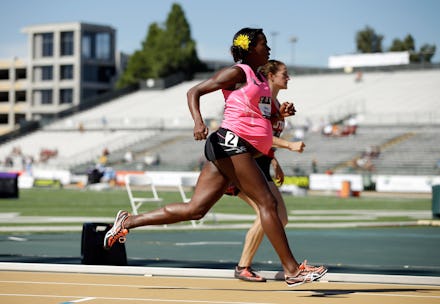Here's what it's like to be an Olympian after giving birth

Olympic athletes seem to have superhuman bodies — and so do new moms, if you count multitasking while breastfeeding a newborn as a superhuman skill.
This summer, 10 Olympic athletes who are also new moms will be representing the United States at the 2016 Summer Games, according to an email from the United States Olympic Communications teams. Women like track & field star Nia Ali and veteran beach volleyball star Kerri Walsh Jennings are balancing their postpartum lives with the physical demands of being a professional athlete.
From breastfeeding before the game to the rigors of training while carrying a human inside you, here's what it's really like to be a brand-new mom competing in the most competitive sports event in the world.
Hurdler Ali gave birth to her son Titus in May 2015. This year, she's competing in the 2016 Olympics in Rio — and even though it's only been a little over a year since having a child, she says she feels like she's in peak physical condition.
"My mentality in training and competition has gotten leaps better [after giving birth]," Ali said in an email from Rio. "I feel more myself than I've ever felt."
Some athletes, like volleyball star Walsh Jennings, have competed in the Olympics during their pregnancy. After giving birth to her third child in April 2013, it took Walsh Jennings several months of rest and training to get back on track for Rio 2016.
"I have been asked countless times if I regret coming back so soon after my pregnancy," Walsh Jennings wrote for ESPN after her first comeback tournament in August 2013. "To this I always say, 'Heck, NO!' I love my job."
Many women like Ali choose to continue training throughout their pregnancy rather than taking time off, so long as they adjust their workout regimens to fit doctor's recommendations based on the woman's unique body and habits. Professional runner Sarah Brown also trained for the Olympics this year while she was pregnant, competing in the Olympic trials a mere four months after giving birth to her daughter Abigail.
While previous medical wisdom has dictated that it's unsafe for women to exercise during pregnancy, doctors now agree that maintaining a consistent, low-key fitness regimen throughout pregnancy is good for expecting moms.
Yet even athletes who have trained consistently throughout pregnancy feel that their bodies have significantly changed after giving birth. Two-time Olympic runner Kara Goucher, who has previously competed after giving birth but won't be competing in Rio this year, felt that giving birth increased her endurance and made her legs stronger.
"I ran throughout my pregnancy, but I was surprised how strong my legs were after having my son," Goucher told ESPN. "I was surprised at how a 20-mile run wasn't that bad. The speed took a while to come back, but my legs actually felt stronger after I gave birth than they ever had previously in my career."
Few studies have explored the long-term effects of childbirth on athletic performance. While rumors have circulated that some female athletes have engaged in "abortion doping," or deliberately getting pregnant as a way to experience the increased rush of hormones before having an abortion, these accusations are widely unfounded.
Yet even months after giving birth, athletes who choose to breastfeed need to adapt their training to work around feeding schedules. The San Francisco Chronicle reported that Olympic swimmer Dana Vollmer was still breastfeeding several times a day when she competed in the summer nationals and training for the upcoming games in Rio.
"I feel happier with my sport than I ever have been," Vollmer told the Chronicle. "I'm super excited to get up and train. I just have a better balance. It's a different journey."
Ali also thinks being the mother of a newborn does give her an "extra edge," although she is unsure if that boost in physical strength came from the pregnancy itself or the joy she now feels with her newborn son.
"My body feels better than ever but I don't know [if that is] because [I've changed] physically, or if I've kind of told myself that regardless of the waves, I need to adjust my sails and embrace the feelings to make good of them," Ali said.
Read more: